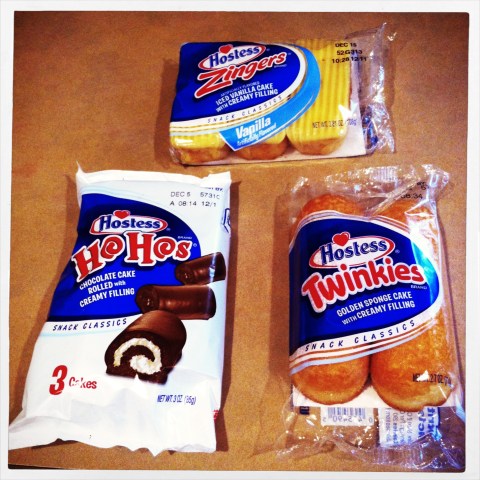Recently it seems that any little thing might be a sign of The End of Days.
We have endured the threat of an avian flu apocalypse and an unrelated, but unnerving bird apocalypse. There have been snopocalypses, a few snomageddons, or stormageddons. Fears of swine flu inspired Pork-pocalypse. On the horizon there are various immanent economic apocalypses. It seems that every few months the arrival of an invasive species, an unexpected weather event, spreading disease, natural disaster or humanmade catastrophe is interpreted as a harbinger of doom.
Last Friday it happened again.
November 16, 2012 began as an unremarkable Friday. By late morning, however, urgent reports spread like wildfire through broadcast news and social media that Hostess Brands Inc. was going out of business.
It was the Twinkie Apocalypse.
Initially I thought the messages were funny—the idea of no more Wonderbread was another entertaining tidbit to “like” on Facebook.
Soon, however, the gravity of the situation sank in as I contemplated living the rest of my life without ever eating another Twinkie or HoHo or Cupcake or Fruit Pie. I grew up with the familiar flavors of Hostess’ supersweetened, preservative-laced bakery products. They made great snack foods for the work breaks of my teenage years.
While Hostess products later became “junkfood” and it had been ages since I last purchased a fruit pie, staring into the yawing abyss of The End, I became irrationally agitated. Familiar with the many scripts of disaster from TV and movies—plagues, floods, earthquakes, cosmic catastrophes, nuclear annihilation, or alien invasion—I instinctively knew how to respond. I grabbed my friend and colleague, Brian, and hurried over to a local convenience store to clear the shelves of all the remaining Twinkies and HoHos.
By the time we arrived, most of the Hostess products had already been picked over and there were only a few left: Three packs of twinkies. A single pack of Hohos. I grabbed the last pack of vanilla Zingers just in case.
You never know.
Brian got my back while I paid for the modest haul. A woman in line behind me pointed to a pack of my Twinkies. “Are those the last Twinkies?” I defensively replied, “Yes.” She asked to take a picture with the last pack before I walked away with it.
As we walked back to campus, I gave Brian a pack of Twinkies and shot a photo. With some melancholy, I realized, that it was quite possibly the last photo he would ever take with a pack of Twinkies. Of course, it was also the first photo he had ever taken with a pack of Twinkies.
Clutching my plastic bag of Hostess products I returned to my office to finish the day’s work. At the end of the day I transported them home and carefully arranged them on my kitchen counter. I’m pretty sure that we have never had any of those products in our home before, but on their final day I finally appreciated them. It was an eleventh-hour conversion.
I contemplated how to preserve my final stash for the future. I paused. I didn’t know if I should refrigerate them, freeze them, store them in the dark, or just leave them on the counter. Confused and disoriented by the sudden disappearance of one of life’s constants, I brewed myself a cup of strong coffee and I went online to seek answers to the catastrophe.
Even I wasn’t expecting the news to be as bad as it was. It wasn’t just the end of Twinkies and HoHos and SnoBalls and Cupcakes and Zingers and Wonderbread. Judging from the news coverage, something much more important was killed in the crossfire—”America” had become collateral damage. The nation had lost something valuable. “Twinkies were America’s favorite junkfood” as American as apple pie. They might have been unhealthy, but they were “All-American Junkfood.” A CNBC correspondent’s article title said it all: No More Twinkies? It. Can’t. Happen. In. America.
Who had done this? Who was responsible? In films The End is always precipitated by vanity, hubris, pride, or divine judgement. The mad scientist builds the bomb or synthesizes the killer plague. The madman presses the button. The flood or asteroid ends life in the random act of a vengeful God.
I was shocked when I learned the truth. I couldn’t believe my eyes. After 82 years of business and a baking empire that stretched from sea to shining American sea, the venerable corporate giant was brought low by the most unlikely of assailants. I sat stunned in the glow of my iPad’s newsreader…
…the Bakers had done it.
How was it possible? How could they have done it? Weren’t they the ones who made the fantastic treats. Weren’t the bakers the artisans of Cupcakes, Twinkies and SnoBalls? Didn’t they fashion them from various ingredients and then frost them with love? It seemed that I had a naive understanding of the real world.
According to the official press release on the Hostess website and individual letters written to employees, customers and suppliers by the company’s CEO, Greg Rayburn, Hostess was “unprofitable under its current cost structure” because of commitments to union wages and obligations to pensions.
The letters detailed how company management had struck deals with various groups of workers at Hostess, but one group held out. In the end they offered the Bakers a reasonable deal, but the unreasonable bakers wouldn’t give in. They just wanted too much. As the Senior VP for purchasing describes:
“…for many months the Company has been working with our unions, lenders and other stakeholders to reach a consensual resolution to legacy costs and labor contracts. Despite everyone’s considerable efforts, when we began implementing the Company’s last, best and final offer, the Bakers Union chose to stage a crippling strike. This affected Hostess Brands’ ability to continue to make products and service its customers’ needs and pushed Hostess into a Wind Down scenario.”
The narrative of the Twinkie Apocalypse as it played out in the media was largely this: The unions wanted too much. The burden of legacy entitlements was too great. The Company could offer nothing more. Surrounded by the unreasonable Baker hordes the Company had no other choice. To serve their customers needs they had to End it All. I imagined Charleton Heston at the end of Beneath The Planet of the Apes—wounded and without hope falling on armageddon’s lever with his dying breath.
Hurray for the courageous CEO, taking a stand for us, for Hostess, for our American junk food. When you miss your Twinkies, your HoHos and your Cupcakes think of him. Think of Greg Rayburn finally falling to his knees, overcome by the advancing strikers. Defending the customer’s right to a Twinkie to his last gasp.
Roll Credits.
In the nostalgic “old days”—dare I say the days of Twinkie the Kid or Fruit Pie the Magician—that is how the story would have ended. Certainly, when I first heard the news of the Twinkpocalypse I imagined a world of no survivors and no hope. The nightly news broadcast that evening ended with reporters communally sharing their final Twinkies. News outlets showed grocery store shelves cleared of product. Websites were already circulating Do-It-Yourself Twinkie Recipes. The Baker’s brinkmanship had thrust us back into a primitive, pre-Twinkie stone age world where we would have to fend for ourselves.
Despite the hysteria, there is no reason to fear the Twinkie Apocalypse. Things are different now.
In the old days movies ended with heroic gestures for grand ideals and rode off into the sunset. The opponents of the modern age—Frankenstein’s monsters and vampires, invading armies, aliens from outer space—were finished off by heroic effort and the common folk saved. We had happy endings that reaffirmed an explicit morality. In the old days Hostess would tragically die and we would leave the theater all weepy.
These days, however, we all know the dead never really die. This is the age of zombies. When things die they are reanimated—stripped of personal complexities and idiosyncrasies— as simple beings that seek only to satisfy their single desire. What is a brand, but the reflection of desire? The official press release said it best:
The Board of Directors authorized the wind down of Hostess Brands to preserve and maximize the value of the estate…
Hostess must die, so that it may live.
Serve the customer. Destroy the union jobs.
Kill the patient. He will come back.
We have not seen the last of Twinkie The Kid. He has been spared the associations of a long labor battle. His reputation will remain untarnished. With no blood on his hands, he will be sold off to the highest bidder and live to ride another day. Twinkies will be back from the dead, produced by a different company by different bakers—surely ones without a union. In fact, given their long shelf life, these days Twinkies could probably be produced in China and shipped to the US. Regardless, when they do return I’m sure they will be marketed as “the same Twinkie you remember,” yet they will be different—undead Twinkies.
There is a popular perception that Twinkies last forever. Over the past few days a number of people have pointed out the irony that the company that bakes the “unspoilable” Twinkie has reached its own sell by date. But what is a company but the people who comprise it? Hostess is, of course, not just “the value of the estate.” It is the livelihood of 18,500 human beings who work there, many of them for most of their lives. The press release, and comments by the CEO in other interviews make it clear that those workers are being sacrificed for a higher purpose—investor value.
The Twinkies, however, have certainly outlived the jobs of their bakers. These days there is no better antidote to the incurable symptoms of corporate social contracts than The End. The End is a convenient way for corporations to break unions and privatize value while socializing responsibility for benefits. In fact, the Hostess products that my colleague, Brian, and I liberated from the local convenience store on The Last Day will probably still be edible when the last of the 18,500 laid off workers finishes filing for unemployment benefits. Those benefits, paid for by taxpayers, will help maintain “the value of the estate”—keeping Twinkie the Kid on corporate welfare until he can ride again. The End of Hostess is also, most certainly not The End of Mr. Rayburn. In fact, I am sure that his next employer will be impressed by his “leadership.” After all, it takes a lot of moxie to push the button.
The Hostess products on my kitchen counter aren’t just a nostalgic reminder of the bad eating habits of my youth. They are also a reminder of how much Capitalism always benefits from a good apocalypse.






Thanks for pulling together this critical analysis. I had heard that this story was really about union busting, but the
‘maximizing the value of the estate’ quote makes it perfectly clear Twinkies are not going away. It’s just the union jobs that are going away. It’s not the Undead Twinkies that scare me, it’s the economic damage that scares me.
LikeLike
The Twinkie Apocalypse already has a page on meme generator. http://memegenerator.net/Twinkie-Apocalypse
LikeLike